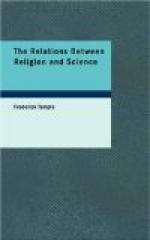And this claim, which He has thus made, and which was thus accepted by His disciples, is corroborated by the power, different in form but similar in kind, which He exerted then on the men of His own day, and has ever since continued to exert on all succeeding generations. The first disciples were under His absolute dominion. They preached Christ and not themselves. They referred everything to Him, and professed to have no power but from Him. St. Paul with all his genius and marvellous power of influence, yet professes to be nothing without Christ and to be everything in Christ. Our Lord left no writing behind Him, but committed His Revelation to His Apostles, and we only know Him through them. But they are not like ordinary disciples of a great teacher; philosophers succeeding a philosopher; prophets succeeding a prophet. To no one of them does it occur for a moment to teach anything except as from Him. St. Paul gives advice sometimes which he does not profess to be giving by our Lord’s command, but when he does so, he puts the mark of his own inferiority on what he says, and claims for it no such authority as belongs to a word from Christ. A word from Christ was final on all subjects.
And this power over men has never weakened from that day to this. There is no other power like it in the world. Science proceeds in far the majority of cases by trial of some theory as a working hypothesis. Such too has been the procedure of Christian Faith. Trust Christ; stake your happiness on Him; stake your hope of satisfying all spiritual aspirations on Him; stake your power of winning the victory over temptation on Him—this is the exhortation of Apostle, and martyr, and saint, and evangelist, and pastor, and teacher. And those who have thus tried the strength of the Christian hypothesis have not failed. The Christian Church has been stained with many a blot. Ill deeds have been wrought in the name of Christ. Evil laws have been passed. Strange superstitions have prevailed. But no other body can show such saints, no other body can produce so great a cloud of witnesses. It is certain that the lives and the deaths, the characters and the aims, of those who have trusted their all to Christ have made them what He bade them be, the salt of the earth. And they testify with one voice that they know no other power which has upheld them but the power of Christ whom they have taken for their Lord. Others have sometimes been set up as in some sort rivals to Him as teachers or as examples; but here there is no rival even pretended. In no other man have men been called on to believe as a living present power, able to give strength and victory in the conflicts of the soul. The Church, too, has passed through times of spiritual depression, we may almost say of degradation. And in the worst of times within the Church there has always remained a wonderful recuperative power, which has shaken off inconsistencies and defects in the past, and will do so yet more in the future. But this recuperative power has always shown itself in one form, and in one form only, namely, a return to Christ and to trust in Him, a trust which has never been falsified.




